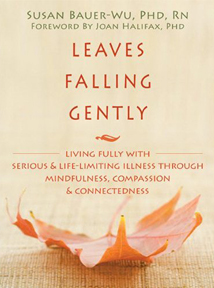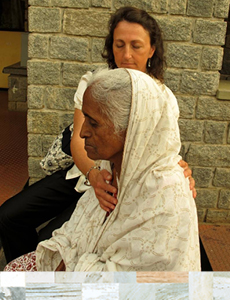Meditations on Cancer

Susan Bauer-Wu's (left) studies involve nurses at Winship Cancer Institute, including nurse practitioners Jessica Thomas 06N 10MN (center) and Kate Carlson Wrammert.
Mindfulness-based interventions help patients cope
|
Reaching a Milestone: Scholarships: Faculty Research: Service-Learning: |
Cancer patients often endure pain, fatigue, and uncomfortable medical treatments while living with an overwhelming sense of uncertainty and fear.
“A lot of times, they feel their bodies have betrayed them,” says Susan Bauer-Wu PHD RN FAAN, a Georgia Cancer Coalition Distinguished Cancer Scholar in the School of Nursing. “I try to help cancer patients befriend their bodies again and foster a sense of acceptance and peace of mind with whatever is happening.”
Bauer-Wu has devoted much of her career to researching how psycho-behavioral interventions, such as music and writing, affect cancer patients’ symptoms and treatment experience. At Emory, she has concentrated on a tool for connecting the mind and body that’s been around for thousands of years: meditation.
In a recent clinical trial, funded in part with $500,000 from the Georgia Cancer Coalition along with a major grant from the National Institute of Nursing Research, Bauer-Wu sought to determine whether mindfulness meditation affects the well-being of cancer patients undergoing hematopoietic stem cell transplant. For many patients, she found that it does.
These patients experience major anxiety, in no small part because they are stuck in a hospital for about three weeks and are worried about relapse of their disease in the future.
Health care professionals (primarily nurses) trained in mindfulness meditation visited the patients in their hospital rooms twice a week. The patients also received a CD on guided meditation to listen to in the hospital and when they went home. This program helped cancer patients learn how to meditate and bring mindfulness and self-compassion into their everyday lives.
Patients feel better and more in control after they meditate. Their heart and respiratory rates drop, and self-reported symptoms, such as pain and anxiety, also decrease. They learn not to panic during the ups and downs of their treatment and in the months following cancer therapy.
“If a cancer patient has a new pain in their body, they may automatically think, ‘Uh oh, the cancer’s come back,’ ” Bauer-Wu explains. “Many patients have such stories running around in their heads. In reality, there are a lot of reasons why they could have that sensation, with cancer recurrence being just one possible explanation.”
|
|
A student of meditation who has visited Nepal, Tibet, and India on medical missions, Bauer-Wu stresses that the meditation she favors for patients is secular, not religious.
“While the principles of mindfulness meditation are based in Buddhism, our work is not about religion or anything particularly Eastern per se,” she says. “Bringing awareness to present-moment experience with an attitude of openness and kindness—at the heart of these practices—is universal to people of all faith traditions.”
Bauer-Wu is a longtime proponent of mindfulness, a philosophy that has been used in medical settings and based on the Mindfulness-Based Stress Reduction program founded in 1979 at the University of Massachusetts Medical School, where Bauer-Wu once served on the faculty.
“So often, we’re not even aware of what we are doing or thinking,” she says. “We’re on autopilot. With mindfulness, patients are taught simple practices to ground themselves back into the moment, to be aware of what’s happening, and have more control over what’s happening to them.”

Web Connection: |
Bauer-Wu has taken mindfulness practices and customized them for patients with cancer and other serious illnesses. For instance, cancer patients are taught to eat mindfully by practicing with ice chips. Mindful movement through a gentle range of motion exercises, even while lying down, also is taught.
In 2007, Bauer-Wu was recruited to Emory from the Dana-Farber Cancer Institute in Boston, where she studied how music and writing helped cancer patients deal with their illness and began her research on mindfulness meditation. After joining Emory, she subsequently analyzed her writing and music research and undertook different studies of meditation.
Her new book, Leaves Falling Gently: Living Fully with Serious & Life-Limiting Illness Through Mindfulness, Compassion & Connectedness (New Harbinger Publications, 2011), includes inspiring stories and easy-to-follow exercises to help people cope with illness and physical discomfort. The 175-page book was available in September.
-Ralph Ellis
|
Bauer-Wu has taken mindfulness practices and customized them for patients with cancer and other serious illnesses. “With mindfulness, patients are taught simple practices to ground themselves back into the moment, to be aware of what’s happening, and have more control over what’s happening to them." |
||||




